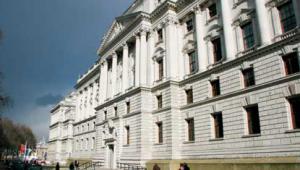That was the conclusion of public sector groups and the chair of the Public Accounts Committee following the chancellor’s statement in the Commons yesterday.
CIPFA’s chief executive Rob Whiteman suggested the prospects for public services remained bleak. This was despite Hammond announcing billions of pounds for public services, including £650m for adult social care next year and £1bn for the Ministry of Defence.
“It was something of a ‘trick or treat’ budget for local government,” Whiteman said and should have offered “new revenue sources to be at all sustainable”.
“The long-term challenges are greater than the short-term ones for local authorities, and the Spending Review prospects remain bleaker for many public services, and notably so for local government,” Whiteman said.
Meg Hillier, chair of the Public Accounts Committee, stated: “This was a smoke-and-mirrors Budget, offering sticking-plaster funding but paying scant regard to deep-rooted challenges facing the UK.”
She added: “The Public Accounts Committee has made clear, the crisis in social care and local government funding requires more than a one-off grant.
“Councils and care providers need to plan and deliver a sustainable care system – yet there is still no detail on future funding.”
Lord Porter, chair of the Local Government Association, said that the funding handed out in the budget fell “short of what we need in the long term”.
He said: “Councils were at the front of the queue when austerity started so local services should be at the front of the queue if it is coming to an end.”
Porter added: “While this funding will ease some of the immediate financial pressure facing councils and our local services, it is clear that this cannot be a one-off. [This] funding is a start, but the real test will come in the Spending Review next year.”
Martin Reeves, Solace spokesperson for local government finance, said: “Unlike the NHS, which has been offered both multi-year funding and a commitment to a 10-year plan, local services have to make do with sticking plasters yet again. The creation of more short-term funding pots is no way to get value for money from public spending.”
Paul Dossett, head of local government at consultancy Grant Thornton, said: “Instead of meaningful long-term preventative solutions, we were offered a large number of short-term solutions with no clear commitment to future sustainability.”
Torsten Bell, director of the Resolution Foundation, said the Budget was easier for Hammond than expected, although he predicted there would be “tougher choices for chancellors in the years ahead.”
“Brexit must be delivered smoothly, public spending will remain tight, and forecasts may not always be so rosy,” Bell pointed out.
Whiteman highlighted that although the OBR forecast said the government’s debt will fall to 80% of GDP in 2022-23, without any changes in policy it is also predicted to rise to 282.8% of GDP in 2067-68.
The shadow chancellor John McDonnell tweeted:
The Prime Minister promised to end austerity. She raised people’s hopes. After yesterday's Budget, no wonder there are so many teachers, police officers and local councillors who feel bitterly disappointed at the Prime Minister’s broken promise. #Budget2018
— John McDonnell MP (@johnmcdonnellMP) 30 October 2018
Additional comments on yesterday’s Budget announcement:
by Simone Rensch
Social care:
President of the Association of Directors of Adult Social Services Glen Garrod said the “era of austerity is indeed not at an end for older and disabled people” as council’s remain under pressure to deliver services.
The Local Government Association’s chair Lord Porter said: “Local government in England continues to face significant funding gaps and rising demand for adult social care, children’s services and homelessness support will continue to threaten other services our communities rely on, like running libraries, cleaning streets and maintaining park spaces.”
Grant Thornton’s head of local government Paul Dossett said it was “a surprise” that children’s services did not get any additional grants given the support that “struggling councils” need.
Health:
The Health Foundation said the NHS was “the clear winner” in the Budget but there was a “big risk that it won’t feel like that in hospitals and GP surgeries over the coming year”.
It added: “Extra funding starts next year and rises to £20.5bn in 2023/24. This money is for front-line NHS services. It excludes wider areas of vital health spending where funding is also desperately needed; public health, workforce training and capital investment.”
The foundation also warned that the abolishment of PFI could leave a hole of £3bn in the health services’ investment budget.
Dossett said: “The extra boost for mental health services was another indication of a “sticking plaster” mentality – rather than an investment in prevention.”
Housing:
Solace spokesperson for local government finance Martin Reeves said: “The real breakthrough in the Budget is the confirmation of the lifting of the housing borrowing cap, which is both a vote of confidence in local government and a shot in the arm for the social housing that our communities desperately need”.
Savills Housing Consultancy’s head Helen Collins also said the cap was “excellent news” but the challenge remains for councils to deliver and use the resources to build more affordable homes.
Schools:
Kevin Courtney, joint general secretary of the National Education Union, said: “The government has promised more money for potholes than schools in this Budget.
“Schools are struggling to provide a full and well-rounded education and many schools have fallen into debt – money for ‘little extras’ won’t cut it. Parents, teachers, headteachers and school staff will be dismayed.”
The Association of School and College Leaders’ general secretary Geoff Barton also said: “The Chancellor’s comment that this money will help schools to ‘buy the little extras they need’ shows a complete misunderstanding of the prevailing funding pressures. Many schools don’t have enough money to provide a full curriculum or individual support to pupils, let alone provide ‘little extras’.
“What they desperately need is improved core funding. It is a sign of the government’s priorities that it is spending more on fixing potholes than on fixing the school funding crisis.”
The PAC chair Meg Hillier said the funding for “little extras’ for schools” was an “insult to pupils and parents”.
“With schools living through a £3bn reduction in funding in England – unable to afford to pay for staff, and considering short weeks and a reduced curriculum to balance the books – this is simply a kick in the teeth,” she said.
Public services:
Mary-Ann Stephenson, director of the UK Women’s Budget Group, said public services were “all stretched to breaking point” and the Budget was “a series of relatively minor announcements which failed to address underlying issues”.
Torsten Bell, director of the Resolution Foundation think-tank, said the chancellor had the “near impossible task” in his Budget of easing austerity and chose to spend the vast majority of this on the NHS, income tax cuts and a boost to universal credit.
He added: “While yesterday’s Budget represented a seismic shift in the government’s approach to the public finances, it spelt an easing rather than an end to austerity – particularly for low- and middle-income families.”











